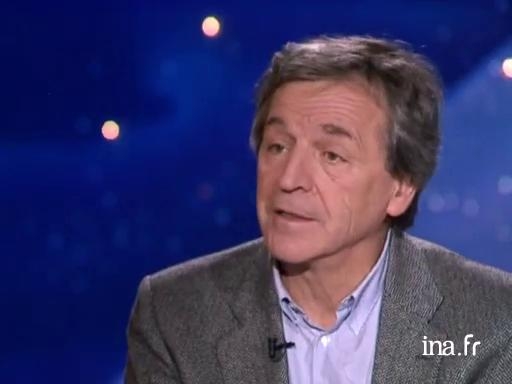Sylvain Augier
A tender look, Costa-Gavras, because it also reminds you of your arrival in France when you were 20 years old?
Constantin Costa-Gavras
Yes.
No, but what they do is still magical.
If the word magic has any meaning, that's what they do.
They do things, I would even go as far as saying they're making poetry, not with words, but with wood.
You take some wood like that, you choose it.
I have a friend whose name is Salvatore Accarde, who's a great Italian violinist, he always comes to France to tune his violins he says, to hear them again along with specialists.
Sylvain Augier
Is that what you find magical?
Constantin Costa-Gavras
Oh but it is magical, yes, yes, yes.
You take some dry wood.
And then, you make that which man needs the most, music.
Sylvain Augier
Is this what you have in common with this young Greek girl?
Constantin Costa-Gavras
Yes, I was amazed to see such passion, yes.
Sylvain Augier
You often say, moreover, I think that your mother was a Peloponnesian peasant and that she left you a bit of paradise in your mind.
Constantin Costa-Gavras
Yes, yes.
Because she believed in the future.
She believed in the future, she loved music.
And she thought that you need to go out, look for other truths elsewhere.
Sylvain Augier
Is this why you came to France when you were twenty years old?
Constantin Costa-Gavras
I actually came to France to study.
Because, you know, the Greeks immigrate elsewhere to earn money or work.
Me, my passion was to go deeper in my studies.
And France was the only country that I would consider, and I think I was right, for advanced studies.
Sylvain Augier
But you started out by washing cars and selling newspapers in the street.
Constantin Costa-Gavras
In France, to live, you obviously had to live, so yes, I needed to earn a bit of money.
Lots of students like me did that back then.
Those were the good old days.
You could find work very easily.
Sylvain Augier
And why did you adopt France?
Constantin Costa-Gavras
Because I wanted to study, because I read the French writers.
Because every time that we opened up a history or art book, we would say, Table X, Louvre Museum.
And Louvre, I would tell myself that that's a magical word.
And I would say to myself: but what is the Louvre?
It represented everything that was very beautiful.
And after that, I learned that the Louvre was the museum of Paris.
Sylvain Augier
Apparently, that's what made Costa-Gavras say that you have two cultures, two nationalities and two personalities, even.
Constantin Costa-Gavras
The one where I was born and the one where I learned about life and art and everything that I knew thereafter.
What I had become.
Sylvain Augier
Because in the end, you were adopted by France the very same way that you chose to adopt this country.
Constantin Costa-Gavras
Yes, I was very lucky I think.
Sylvain Augier
Oh, you feel that you were lucky?
Constantin Costa-Gavras
Yes, of course, yes, yes.
Sylvain Augier
I was also thinking about something else.
Constantin Costa-Gavras
You shoot your films like you would make a violin, with the same precision, with the same attention to detail.
Sylvain Augier
It's also been said that you start your films like a writer starts writing a book, in silence.
Constantin Costa-Gavras
That's true, that's true.
What's amazing, is that, like them, we don't know what it's going to be like in the end.
The sound that it will give off.
And sometimes we fail.
So for us, when we screw up a film, it's terrible.
But them, they can write another one.
And it's not as expensive as making a film.
But it's the same anguish, the same desire to hear the sound.
And worse, when we've finished a film, we don't hear the sound anymore.
You have to go into a theatre and hear the public.
How it reacts, whether it likes it or not.
Sylvain Augier
There was an experiment that was done, it was amusing, Patricia Mikalev, who reported on it told me about it, the Japanese tried to enter all of the constraints into a computer, all of the data that you could understand, comprehend about a violin to try t
And it never worked.
It's impossible.
Constantin Costa-Gavras
You obviously need a human behind it.
I even heard a few years ago that they made Beethoven's tenth symphony.
By taking all of the data from the nine others.
Apparently, it was a tragic mess.
Sylvain Augier
The most expensive of all noise.





